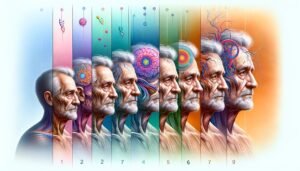7 Stages of Vascular Dementia | Abiding Home Care
Vascular dementia is a cognitive disorder that affects a person’s thinking, memory, and ability to perform daily tasks. It is often caused by reduced blood flow to the brain due to damaged blood vessels. Understanding the progressi Add Formon of vascular dementia is crucial for both patients and caregivers to provide appropriate care and support. In this article, we will explore the seven stages of vascular dementia, from its early symptoms to advanced stages, to help you navigate this challenging journey.

Stage 1: No Impairment
At this stage, individuals do not exhibit any symptoms of vascular dementia. Cognitive function is entirely normal, and there are no signs of impairment.
Stage 2: Very Mild Cognitive Decline
During this stage, individuals may start to experience minor cognitive changes that are often overlooked or attributed to aging. These can include occasional forgetfulness or difficulty finding words in conversations.
Stage 3: Mild Cognitive Decline
As vascular dementia progresses, the symptoms become more noticeable. Individuals in this stage may struggle with memory lapses, such as forgetting recent events or appointments. They may also have difficulty concentrating and organizing tasks.
Stage 4: Moderate Cognitive Decline
In stage 4, cognitive decline becomes more pronounced. Memory problems are evident, and individuals may struggle to recall names and details of their personal history. Daily tasks, such as managing finances or cooking, can become challenging.
Stage 5: Moderately Severe Cognitive Decline
At this stage, individuals require significant assistance with daily activities. Memory loss is severe, and they may not recognize familiar faces, including close family members. Behavioral changes, such as agitation or confusion, are common.
Stage 6: Severe Cognitive Decline
During stage 6, individuals with vascular dementia experience a significant loss of cognitive function. They may be unable to perform basic self-care tasks, such as dressing or bathing, without assistance. Communication becomes severely impaired, and they may be non-verbal.
Stage 7: Very Severe Cognitive Decline
In the final stage, individuals with vascular dementia are entirely dependent on others for their care. They may be bedridden and lose the ability to swallow. This stage is often accompanied by a decline in physical health, making individuals vulnerable to infections.
Conclusion
Understanding the seven stages of vascular dementia is essential for providing appropriate care and support to affected individuals. It is crucial to seek medical advice and support as soon as symptoms become evident to ensure the best possible quality of life for both patients and their caregivers.
FAQs
What are the common risk factors for vascular dementia?
Common risk factors include high blood pressure, diabetes, smoking, and atherosclerosis.
Is vascular dementia reversible?
Unfortunately, vascular dementia is generally not reversible, but early intervention and lifestyle changes can slow down its progression.
How is vascular dementia diagnosed?
Diagnosis often involves a combination of medical history, physical exams, imaging tests, and cognitive assessments.
Can vascular dementia be prevented?
While it may not be entirely preventable, managing risk factors like hypertension and maintaining a healthy lifestyle can reduce the risk.
What are some strategies for caring for a loved one with vascular dementia?
Strategies include maintaining a consistent routine, ensuring safety in the home, and seeking support from healthcare professionals and support groups.
